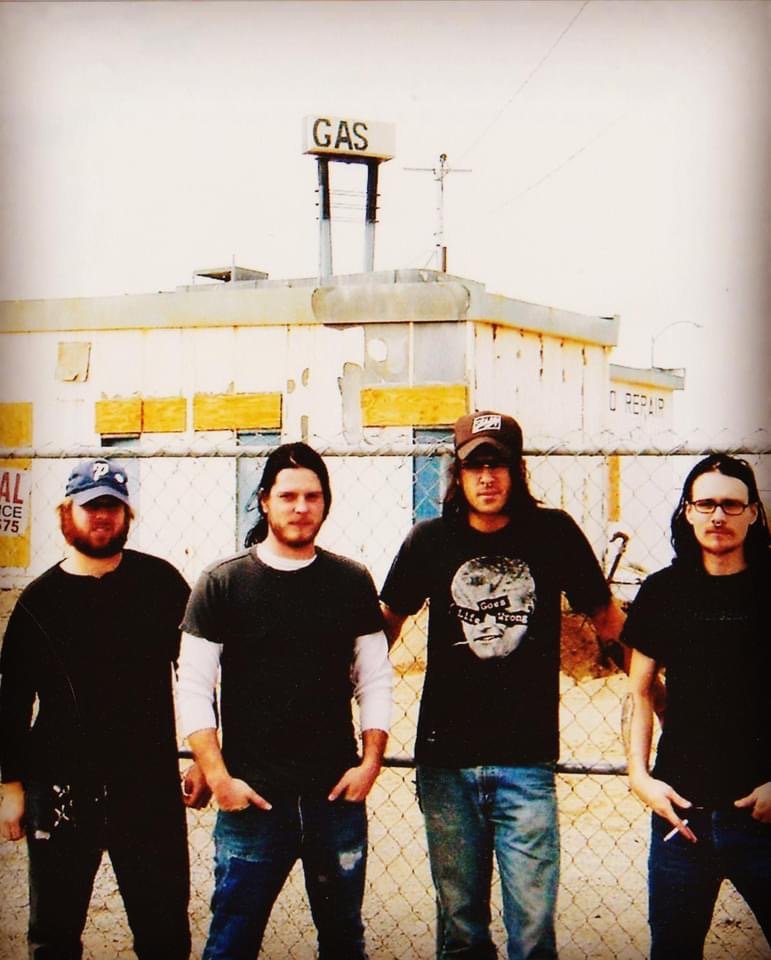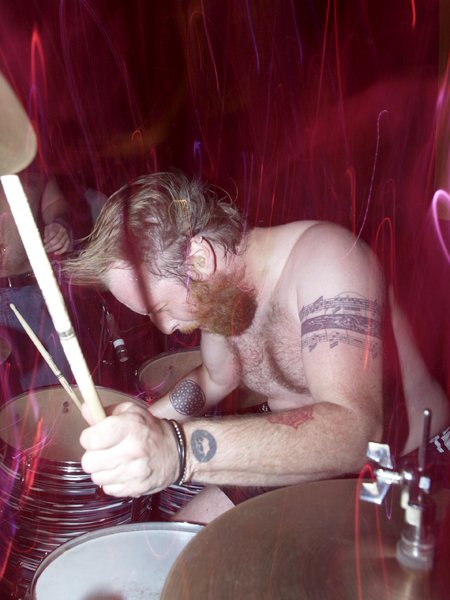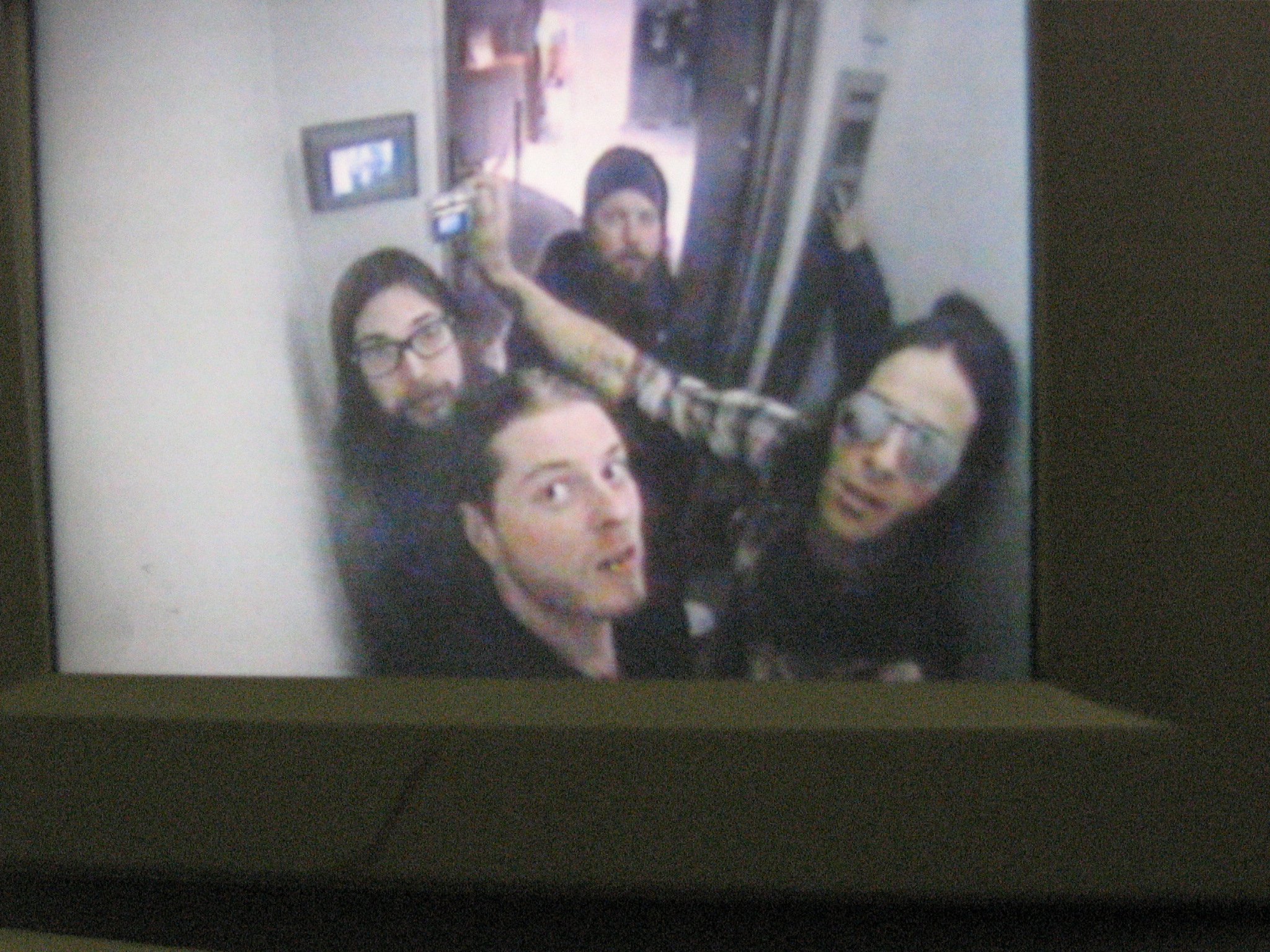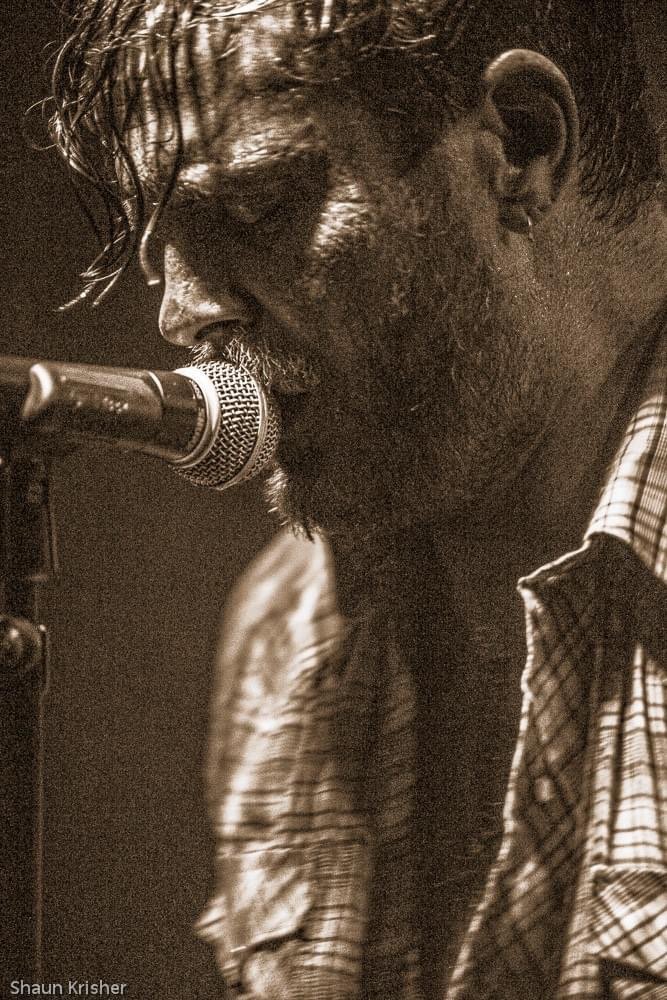PMFS: 27 Years of Abrupt Realizations
By Jonathan Wright
From the Midwest to the Rocky Mountains and around the world, Planes Mistaken For Stars turned youthful dreams into a lasting legacy of musical transcendence through relentless drive and passion.
Our story begins in Peoria, Illinois, a midsized river city tucked amongst the endless cornfields between Chicago and St. Louis — and an unwelcoming home for misfits, despite having incubated one of the greatest misfits of all. For the legendary comedian and social critic Richard Pryor, comedy was a vehicle to escape a lifetime of dreary factory work. For Gared O’Donnell and Matt Bellinger, music was their vehicle for escape.
Born in Peoria
Gared and Matt met in the early nineties, two kids bonding over girls, skateboarding and punk rock. Their first band P.N.D. (Post-Nasal Drip) was a rough facsimile of Black Flag and the Misfits — they played a few shows and went nowhere. When P.N.D. broke up, Matt started a hardcore band, Superego. Gared picked up a bass and formed a pop-punk trio called Dismiss.
The early incarnation of Dismiss wasn’t far removed from the Lookout! and Epitaph bands of the day, but they evolved quickly, morphing from quartet to quintet and back again. Even then Gared was a uniquely formidable figure: a born frontman, cocksure and brimming with charisma. Once Matt and Jamie Drier joined the band, Dismiss counted three future Planes members in their ranks. A quick jaunt to Florida with Champaign-Urbana’s Braid delivered their first taste of life in the van — and they savored the experience. It proved that escape through music was possible with a bit of ambition and grit, an ethos that would guide them into their road-warrior future.
As they honed their punk roots and pop sensibilities into something more substantive, late-period Dismiss was Planes Mistaken For Stars in embryonic form. In fact, the final Dismiss song would eventually become the first Planes song: “The Past Two.”
After Dismiss dissolved, Gared (now on guitar) joined forces with the rhythm section of another up-and-coming Peoria band. His chemistry with Keepsake bassist Aaron Wise and drummer Mike Ricketts was undeniable, and with Matt back in the fold, the new band had a set within weeks. Gared had a name already in mind, an almost painfully literal metaphor he’d conceived while making a wish on a drive to Chicago. Planes Mistaken For Stars was a mouthful but it stuck — Planes for short.
Their first show in late 1997 set Peoria’s Tiamat Records on fire, and the band quickly booked studio time to bottle that electricity. Recorded and engineered by Brendan Gamble of Urbana, IL (who would go on to record two more Planes records), the resulting eight-song EP melded heartfelt melodies to harrowing screams, a timeless debut laying groundwork for bigger things to come. After producing several hundred CD copies, DIY-style, Planes embarked on their first West Coast tour with the Blue Ontario from Denver, Colorado. “[They were] a gang of small-town kids stoked to be driving around in a broken-down van, spitting out their songs and souls in random warehouses and basements every night,” as Blue Ontario guitarist Jason Heller later wrote. “Their equipment was held together by duct tape and dried sweat. And their music? It was a geyser of violence, a sloppy mess of sheer passion.”
Back in Illinois, Planes and a swath of their close friends lived communally in a house on a hill (212 Division) in East Peoria, writing, practicing and partying with youthful fervor. This lifestyle became a pillar around which the band would shape their music, enabling them to escape the Midwest and become a full-time touring band. With Jamie Drier taking over on bass, they pursued a darker, heavier sound and solidified their plans to take flight. Denver, Colorado beckoned.
Pilgrimage to Denver
In January of 1999, the Planes collective crammed all their possessions into a 26-foot moving truck and caravanned through the night and across the Great Plains. On the morning they rolled into town, Denver Broncos fans were celebrating a second straight Super Bowl win: lighting bonfires, breaking windows and turning over cars downtown. It was a fitting introduction as the band prepared to drop an even bigger explosion on Denver’s music scene.
Planes’ Midwestern exodus hit Colorado like a meteorite — and a steady influx of Peoria ex-pats would soon enlarge the crew to a baker’s dozen. Amidst their collective jubilation, the band’s earliest shows at Double Entendre Records were jam-packed as the Denver scene came out in droves to witness the spectacle for themselves. They were immediately embraced. Planes loved Denver, and Denver loved them right back.
This relationship ran both ways: Denver gained a burst of energy that turned the scene on its head, while Planes landed in a vibrant, tight-knit community of like-minded allies. Their new home was much bigger than Peoria, yet small enough to really connect with people. As Planes took that spirit on the road with them, the outside world began to take notice.
New York-based Deep Elm Records gave the band’s debut a wider release and included them in one of its Emo Diaries compilations, attracting the attention of a growing fanbase. But for Planes, the “emo” tag felt acutely misleading. People would come to shows expecting mild-mannered boys in cardigans and leave with their ears ringing, having wrestled a live grenade of spit and sweat. This band was different — and would not be pigeonholed.
As Gared perfected his Lemmy-meets-Springsteen shamanisms, Planes began to splice their punk and hardcore roots with doom metal and rock n’ roll in the tradition of Thin Lizzy, Lynyrd Skynyrd and Black Sabbath. The brilliant “Fucking Fight” seven-inch and Knife in the Marathon arrived next — both issued by Dim Mak Records, a small label run by future DJ megastar Steve Aoki. The Knife EP introduced the Planes’ trademark skull image, presaging the even heavier discography to come.
Yet they never attempted to hide their trademark sensitivity. After each brutal thrashing of a set, Gared would admonish the crowd: “Take care of each other.” Never afraid to show affection, hugs were a given. More family than mere band, the larger Planes crew piled into a former crack house on Josephine Street in Denver — their home base when they weren’t on the road — hosting backyard barbeques and garage shows, friends and strangers alike coming and going. The Josephine house was always a party, and everyone was welcome.
As they graduated from house shows to small clubs and bars, Planes toured relentlessly with the likes of Monotonashhfuck (pre-City of Caterpillar), Small Brown Bike, Kill Sadie, Appleseed Cast, Thursday and Cross My Heart. They released Black Flag covers on Initial Records, played shows with a diversity of bands, from Converge to Cursive, and built unbreakable bonds with Army of Ponch and Hot Water Music — who became labelmates when the band signed with Florida’s No Idea Records.
2001 marked Planes’ first foray into the European underground music scene. They toured for four weeks through Germany, over to the UK and down through Western Europe into Spain, playing mostly small venues and discovering firsthand that the punk rock ethos is an international language. In the fall of 2001, No Idea issued Fuck With Fire, a genre-transcending wall of noise stacked with guitar tracks, recorded quickly while on the road. It continued the Planes trajectory — darker, heavier, rawer — and broke the emo tag for good. 2002’s Spearheading the Sin Movement continued in that vein, its three short songs pummeling any notion that they might revert to something more wholesome. The classic track “Thunder in the Night Forever” embodied the breakneck energy of this time as fans would shout its collective refrain: “We ride to fight!”
Around the World
Planes were blowing up. In 2003 The Denver Post's annual survey of music insiders voted them Colorado's best underground band. That April they opened for the legendary Motorhead. The Josephine house was crawling with touring bands and random strangers sleeping on the couch for days, sometimes weeks on end. It was a vibrant and immensely creative time.
2003 also brought their first lineup change in four years as Jamie chose to leave the band, while a jubilant ball of positive energy assumed his place. Planes knew Chuck French well, having toured with his band Peralta (which included a pair of ex-Peorians) and played some particularly monumental, clothing-free shows in their Chicago loft known as the Milk Factory. Although originally a guitar player, Chuck agreed to join the band on bass and immediately moved to Denver — just in time to record the next album and maintain their relentless touring cycle.
The sessions for Up in Them Guts brought Planes to Lincoln, Nebraska for a week to record with AJ Mogis. The engineer had just helmed Cursive’s The Ugly Organ, and the band was inspired to try a similar approach: something layered and almost orchestral, exploring unconventional sounds and instrumentation such as symphonic chimes, piano and more. Upon its release, the album was celebrated as “a huge leap forward, an ambitious mix of aggression, ethereality and intestine-trawling riffs.” And the road continued its beck and call...
In late 2003 came an opportunity for Planes to open for The Ataris, first in the US and then in the UK alongside their old tour buddies, Cursive. This brought their first taste of 2,000- and 3,000-seat venues — a major departure from the intimacy of their early house shows. The following year they opened for Against Me! on a momentous tour during that band’s rise to fame, joined the Plea for Peace tour with Cursive and Mike Park, played Gainesville’s FEST 3, and hit the road again with Hot Water Music. Successful outings with Dillinger Escape Plan, High On Fire and Kylesa confirmed that Planes could also win over the metal crowd, while headlining tours of the US and UK provided an opportunity to take friends on the road as support, including Glass and Ashes, Bear vs. Shark, Smoke or Fire, The Forecast, Red Cloud, The North Atlantic and others.
This whirlwind of constant touring and commitment to the band eventually led to neglected friends and family, problems at home and overall burnout. In late 2005, Matt decided to focus on his side project, Ghost Buffalo, rather than continue with Planes. What they lost in Matt’s incredible chemistry with Gared, they gained in the addition of Neil Keener, a monster bass player who had migrated from Chicago to Denver soon after Chuck. A guitar player at heart, Chuck returned to his natural instrument — and the final Planes lineup was in place.
Meanwhile, numerous labels were expressing interest in Planes as the band pushed to go to the next level. After a brief courtship with Relapse Records fell apart, the band signed with Abacus Recordings, a subsidiary of Century Media. With added resources behind them, the new lineup headed to Seattle to record with producer Matt Bayles, who had worked with bands such as Isis, Mastodon, Botch, These Arms Are Snakes, The Sword and Minus the Bear. The band rented a house in Seattle for a month, writing, recording, mixing and driving their classic 1978 Bronco tour beast to the studio and back each day. With access to state-of-the-art studios (Studio Litho, Red Room Studio, AVAST) and Bayles’ back-to-basics approach, they shed some of that wall-of-sound orchestration in order to let the raw purity of the music shine.
Released in October 2006, Mercy is more of a straightforward rock record — albeit a thrashing and fiery one. Planes had hoped this record would be heard far and wide, and help to bring more recognition and opportunities to the band . However, Abacus at the time was a sinking ship. They offered painfully little in the way of promotion, and the label quickly folded. Planes soldiered on and toured relentlessly over the next two years, headlining tours as well as providing support for Against Me!, Mastodon, Cursive and Thrice. A particularly memorable 10-day tour of Japan with Converge in Spring of 2007 was another first for the band and solidified a comradery that would eventually lead to future collaboration. But as momentum subsided and other life priorities competed for attention, the band would announce their breakup in the summer of 2007. They booked two final tours (East coast and West coast) to say goodbye to their fans before culminating with a highly emotional finale in Denver in February of 2008.
Prey for Time
Gared went through a divorce, returned to Illinois to be close to his kids and started a new project called Hawks and Doves. Mike moved to Chicago to pursue an advanced degree in ecology, while Chuck and Neil stayed in Denver and shifted focus to their other band, Git Some. While their days of constant touring were behind them, Planes’ big farewell ultimately lasted only a couple of years. By 2010 they were again playing festivals and one-off shows, followed by short tours in 2012 and 2014 — all the while writing new material. After compiling a critical mass of songs, the band retreated to Earth Analog Studio in the tiny town of Tolono, Illinois, where producer and friend Sanford Parker (Yob, Cough, Pelican, Rwake, Indian, Sweet Cobra) forged a new record into shape.
The 2016 release of Prey marked Planes’ first new music in a decade and their first on Deathwish Inc. The months leading up to its release saw a series of video testimonials from members of Mastodon, Converge and others attesting to the band’s enduring impact. Prey delighted fans, bringing more touring and festival appearances — but that enthusiasm soon would be tempered by tragedy.
Although Matt Bellinger continued to make incredible music after leaving Planes (Ghost Buffalo, Il Cattivo), he was never able to overcome his demons. For years he struggled, fighting to stay clean, living on the streets, seeking help from doctors, family and friends; all the while hoping to find a way out, but inevitably being pulled back in. In September 2017, this beautiful, flawed human attempted suicide and died the following day with his family by his side.
Matt hadn’t been in Planes for years, but as a founding member, he left an indelible mark on the music and he would always be a brother. This tragedy affected everyone who knew him, none more than Gared. How are we to process this death? Could we have prevented it? We all wondered.
In the years that followed, Planes continued to play shows and tour sporadically, and even found their way back to Europe. When the pandemic hit, Gared and Neil holed up together in isolation at Gared’s house in Peoria, workshopping dozens of new songs of varying styles, some of which would be released as Blunt Razors, and some of which would become material for the next Planes record. Then the world truly came crashing down.
Even while fighting stage 3 esophageal cancer, Gared pushed hard to complete one more record. Planes entered the studio (again with Sanford Parker) near the end of 2020. The band prioritized Gared’s vocals and guitar parts — he was already weak from chemo, and no one knew what the radiation would do to his vocals. By the time they were ready to mix, Gared was processing his own mortality. And on November 24, 2021, this charismatic force of a human succumbed to the cancer — a dreadful shockwave still ripping through the fabric of space-time.
Now he is gone and the void is deafening. But Do You Still Love Me? is not the last will and testament of Gared O’Donnell — nor Planes Mistaken for Stars. Because their spirit lives inside all the bands they played with, on the arms of fans with tattooed skulls and lyrics, and within the lives they touched, whether for one night or many.
“We managed to stay a band for a long time and stay vital,” Gared told the Peoria Journal Star on their first farewell tour in 2007. “Every record was better than the one before it. There’s kids in Germany with our lyrics tattooed on their arms. We’ve meant something to people… Maybe we’ve made some people feel a little less alone.”

























